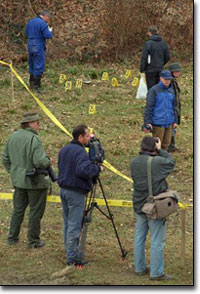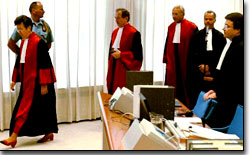


Follow-Up
Related IssueWar Crimes Tribunals: Should Journalists Testify?

Photographers watch as International War Crimes Tribunal investigators gather evidence at a mass grave site identified as "Sahinici 1," 30 kilometers (18 miles) northwest of Srebrenica, Wednesday April 3, 1996. Photo: AP
The question of whether journalists should formally cooperate with official investigations is a contentious one. There is no universally held position on whether or when to participate in official war crime investigations, and the disagreement is especially acute regarding regional ethnic conflicts.
Eight months after David Rohde broke the story about mass gravesites in Bosnia, he returned with a team of war crimes investigators to farmlands near Srebrenica where hundreds of Muslims were allegedly executed by Bosnian Serb military forces. As they walked across a field, Rohde showed the investigators large portions of earth that had been dug up since he had last visited the site, and mounds of dirt and deep tire ruts that had not been there the previous October.
Nearby, the team found human remains and clothing that matched descriptions provided by surviving witnesses of executions. The New York Times reported that Rohde had presented the strongest available evidence that several gravesites had been extensively disturbed.
The International War Crimes Tribunal had recently indicted Bosnian Serb President Dr. Radovan Karadzic and Bosnian Serb military commander, General Ratko Mladic, the latter believed to have personally overseen executions. Rohde's evidence was significant because the disturbed gravesites could add to the charges faced by the men and strengthen the prosecution's case against them.
But Rohde was presenting information that he had already published in his Christian Science Monitor series. He chose not to testify as a witness before the court. Rohde, like his former editor, Faye Bowers, believes that in general journalists should restrict themselves to sharing information they have published or is otherwise in the public record.
Journalists often make good witnesses in criminal proceedings because they are trained to make objective, detailed observations. But many U.S. journalists feel strongly that assisting in any formal capacity with official investigations compromises their objectivity and diminishes their credibility with sources and the public. European journalists often differ, seeing their role as witnesses as an extension of their reporting and as a means of seeing that justice is served. Several British reporters, including the Guardian's Ed Vulliamy, have testified before the War Crimes Tribunals.

Judges enter the courtroom of the International War Crimes Tribunal for former Yugoslavia in The Hague in June 1996. The Tribunal opened hearings blaming Bosnian Serb leader Radovan Karadzic and Gen. Ratko Mladic for a comprehensive strategy of genocide during Bosnia's 43-month war. Photo: AP
It can be painful for a journalist not to testify, especially when he or she has documented cases of gross human rights violations. But Rohde points out that the war in Bosnia involved abuses committed by both sides. It would be a disservice to the reporting if one side felt that a journalist was testifying as part of a vendetta against them, and could well lead to less access to information about its side of the story - including abuses committed against them.
Ultimately, the choice to testify or not can be a struggle among a number of factors, including journalistic culture, the news medium's own practice, and the reporter's conscience.